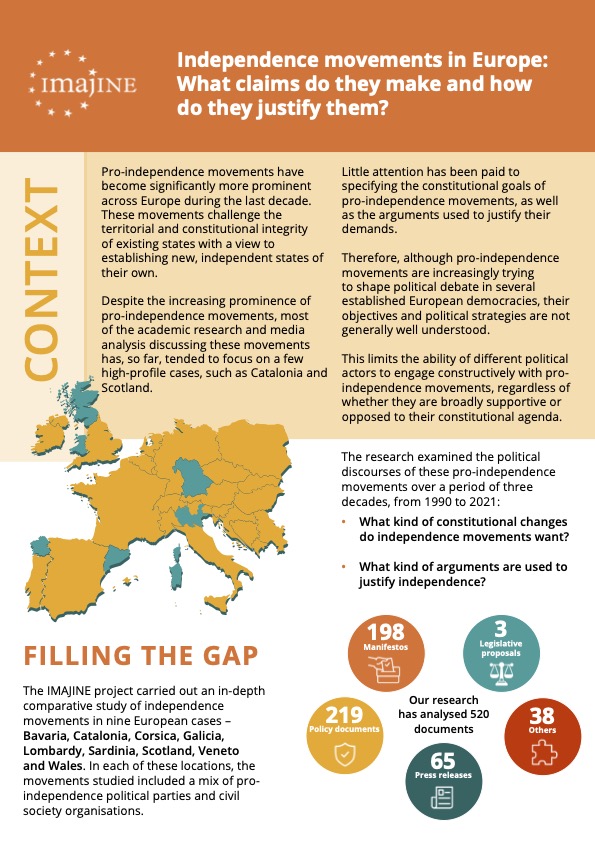Independence movements in Europe: how do they make the case for independence?
Across Europe, pro-independence movements have become increasingly more prominent over the last decade, with some becoming a serious challenge to the territorial and constitutional integrity of their respective states. However, academic and media analysis tends to focus on a few high-profile cases, and the objectives and political strategies of pro-independence movements are not generally well understood.
This IMAJINE project carried out an in-depth comparative study of independence movements in nine European cases – Bavaria, Catalonia, Corsica, Galicia, Lombardy, Sardinia, Scotland, Veneto and Wales – over a period of three decades (1990 -2021). In each case, the movements studied included a mix of pro-independence political parties and civil society organisations. We examined what territorial claims these movements make, and how they justify them.
Our research highlights:
- the extent to which calls for independence are sweeping through Europe;
- the impact of deteriorating socio-economic conditions for the type of arguments made for independence;
- the growing prominence of a democratic case for independence, based on citizens’ democratic ‘right to choose’ how they are governed.
Please get in touch if you’d like to know more about this research and its key findings, or to discuss how our work can benefit your organisation.
For more information, contact Dr Anwen Elias at awe@aber.ac.uk
Underpinning research
Academic Articles published to date
Anwen Elias & Nuria Franco-Guillén (2021), ‘Justifying secession in Catalonia: Resolving grievances or a means to a better future?‘, Politics & Governance, Vol. 9, No. 4.
Anwen Elias, Linda Basile, Nuria Franco-Guillén & Edina Szöcsik, E. (2021), ’The Framing Territorial Demands (FraTerr) dataset: A novel approach to conceptualising and measuring regionalist actors’ territorial strategies‘, Regional & Federal Studies.
Visual report:
Independence movements in Europe: What claims do they make and how do they justify them?
Project Reports
Team

Dr Catrin Wyn Edwards
International Politics
cwe6@aber.ac.uk

Dr Anwen Elias
International Politics
awe@aber.ac.uk

Dr Núria Franco-Guillén
International Politics
nuf@aber.ac.uk

Dr Huw Lewis
International Politics
hhl@aber.ac.uk

Dr Elin Royles
International Politics
ear@aber.ac.uk



